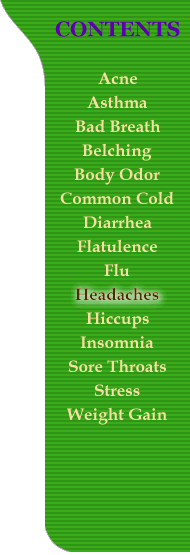| Headaches.
We've all had them. From the tough-day-at-the- office headache to the you-might-as-well-kill-me-now-because-I'm-
going-to-die-anyway headaches. Sometimes, an aspirin or other analgesic
may wase the pain' at other times, nothing short of waiting it out seems
to help.
If you suffer from frequent, severe headaches that put you out of commission several times a month, you need to seek medical attention. Likewise, if your headaches are associated with physical exertion, changes in vision, or weakness, numbness, or paralysis of the limbs, skip the urge to self-treat and see a doctor. If you're already seeing physician and aren't getting relief, think about getting a referral to a headache specialist or headache clinic. However, if you are prone to occasional headache pain, read on. The tips that follow can help you feel a lot better - fast. Don't overdo the pain pills. Although an occasional dose of an over-the-counter analgesic may help alleviate your headache for a few hours, taking these drugs too often may actually worsen the pain. Theses drugs are OK inlimited quantities but if you need to take more than two doses a day, you should see a doctor. Lie down. Lying down and closing your eyes for half an hour or more may be one of the best treatments for a bad headache. For some types of headaches, such as migraines, sleep is the only thing that seems to interrupt the pain cycle. The most important thing is to recognize that the faster the patient with a severe headache stops what they're doing and goes to bed and rests, the faster the headaches will go away. You need to recognize when the big headache is coming. That's the time to give up and go to bed. Don't let the sun shine in. Especially if your symptoms resemble those of a migraine (such as severe pain on one side of the head, nausea, blurred vision and extreme sensitivity to light), resting in a darkened room may alleviate the pain. Bright light may also cause headaches. Sometimes, looking at a computer screen may bring on a headache. Tinted glasses may help. Use a cold compress. A washcloth dipped in ice-cold water and placed over the eyes or an ice pack placed on the site of the pain are other good ways of relieving a headache. Other good solutions are the 'headache hat,' which is an ice pack that surrounds the head and the ice pillow, which is frozen gel pack that is inseted into a special pillow. Using ice as soon as possible after the onset of the headache will relieve the pain within 20 minutes for most people. Try heat. If ice feels uncomfortable to you, or if it doesn't help your headache, try placing a warm washcolth over your eyes or on the site of the pain. You should leave the compress on for half an hour, rewarming it as necessary. Think pleasant thoughts. Many headaches are brought on or worsened
by stress and tension. Learning to handle life's difficulties in a calm
way may keep the volumedown on a bad headache. Turn off all thoughts of
unpleasant, crisis-provoking things. Think about pleasant things. Just
for the moment, try to forget about the confrontation with the boss or
the coworker. Try to relax while you work out a strategy to cope with the
problem.
|
 |
|
|
Recipes for
Relaxation The entire relaxation exercise, which relaxes the facial area, neck, shoulders and upper back, takes about five minutes. Before you begin, make sure you won't be disturbed. 1. Settle back quietly and comfortably into a favorite chair or sofa. Allow your muscles to become loose and heavy. 2. Wrinkle up you forehead, hold it, then smooth it our, picturing the entire forehead becoming smoother as the relaxation increases. 3. Frown, creasing your eyebrows tightly, feeling the tension. Let go of the tenson, smoothing out your forehead once more. 4. Close your eyes more and more tighly. Feel the tension as you hold them shut. Relax your eyes until they are closed gently and comfortably. 5. Clench your jaws and teeth together. Feel the tension build, then let go and relax, letting the lips part slightly. Allow yourself to feel relief in the relaxation. 6. Press your tongue hard against the roof of your mouth. Again, feel the tension, then relax. 7. Purse your lip together
more and more tightly, then relax. Notice the contrast
between tension
and relaxation. Feel
the relaxation all
over your face, forehead and
scalp, eyes, jaws, lips and tongue.
|
||